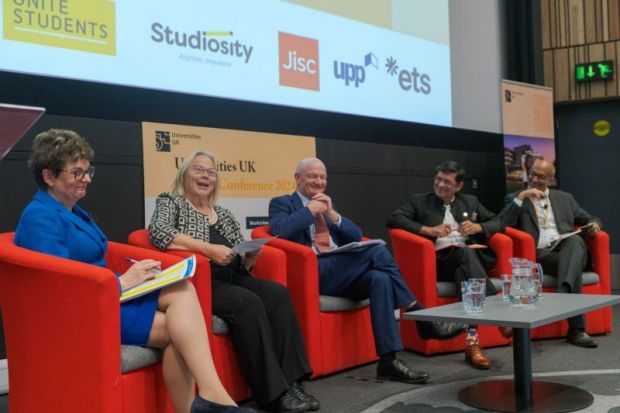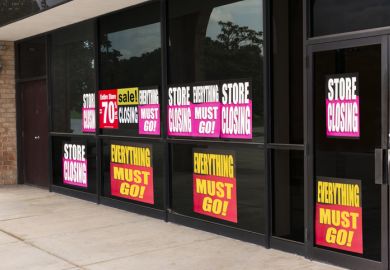English funding per student would need to rise to £12,500 to get universities back to break-even levels, according to a university leader, with the government coming under pressure to move on the issue “before it becomes harder”.
Shitij Kapur, the vice-chancellor of King’s College London, told the Universities UK conference that a forthcoming blueprint to be released by the organisation later this year has costed the level of funding universities need to return to 2015-16 levels, the last period when they were considered to be on a stable footing.
The “number to ask for”, Professor Kapur said, was between £12,000 and £13,000, with the deficit from the current fee level of £9,250 needing to be made up either by increasing fees or more public subsidy.
But he conceded that asking for what would be an increase in fees of more than a third “might seem out of touch and clueless” to the public, and it would be a hard enough sell for the government to index fees to inflation, which would result in a rise to only £9,600 and the likely outcome still “managed decline”.
A draft of the blueprint, said Professor Kapur, who has acted as a commissioner for the initiative, asks for ministers to “increase funding for teaching to meet their real costs” through a combination of fee increases and restoring the teaching grant, without putting a number on it.
The real value of fees has been heavily eroded by inflation and rising costs since the increase to £9,000 in 2012, with a small boost of £250 in 2017 doing little to close the gap.
A Universities UK spokesperson said the £12,000 to £13,000 figure had been calculated based on what the investment in teaching would be had it kept up with inflation but stressed that “we are not calling for tuition fees to rise to this level”.
“In fact, more and more of the burden is falling on graduates, and the UK is increasingly an outlier within the OECD on this...and we believe it is time for a re-balancing of responsibility for funding to recognise that”, they added.
Lord Willetts, a former Conservative universities minister, said “now is the moment” for the new Labour government to increase fees, as his experience in government had shown that “these things do not get easier, they get harder”.
“There is a deal to be done and it needs to be done urgently, and I think that is achievable,” he told the conference.
Lord Willetts said “nobody” wished to face the crisis of a university going bust, and there was “genuine anxiety” in government that this might happen.
He said there was no need for another “elaborate, long review”, because there “is no brilliant alternative system waiting to be discovered”, and “we need to get on with it because students are getting a raw deal” owing to a gradual erosion of the student experience.
The former minister, now president of the Resolution Foundation thinktank, said there would need to be a “quid pro quo” in return for increased fees, which could involve “tougher metrics”, and the sector would need to show how the teaching experience would improve.
Any agreement would need to enable “a minister to stand up in the House of Commons and say this is a deal which benefits students, which puts the finances of key players in the British economy on a sounder footing and will, of course, not involve anyone paying any more upfront”, he said.
Addressing vice-chancellors at the start of the conference, Dame Sally Mapstone, the president of UUK, said many institutions stood at a “fork in the road” in their history.
“We can allow our distinguished, globally competitive higher education system to slide into decline. Or we can act together, as institutions, and with government, to ensure that higher education is able to deliver for the nation into the 2030s,” she said.
Universities should not be afraid of change, said Dame Sally, the principal of the University of St Andrews. She added that this “may create the impetus to try things which would otherwise have felt impossible, or to collaborate where previously there was no reason to do so”.
“But it also means hard choices about what universities should stop doing. We cannot continue to do more with less.”
Register to continue
Why register?
- Registration is free and only takes a moment
- Once registered, you can read 3 articles a month
- Sign up for our newsletter
Subscribe
Or subscribe for unlimited access to:
- Unlimited access to news, views, insights & reviews
- Digital editions
- Digital access to THE’s university and college rankings analysis
Already registered or a current subscriber?








